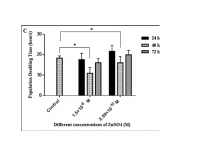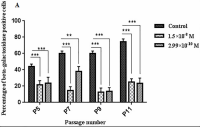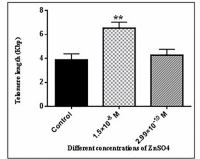Polygenic basis and biomedical consequences of telomere length variation
https://doi.org/10.1....03.23.21253516
Here we characterize the genetic architecture of naturally-occurring variation in leucocyte telomere length (LTL) and identify causal links between LTL and biomedical phenotypes in 472,174 well-characterized participants in UK Biobank…Finally, we estimated that at age 40 years, people with >1-SD shorter compared to ≥1-SD longer LTL than the population mean had 2.5 years lower life expectancy.
Thanks to Phoebus for posting.
All the genetic contributions to LTL were extremely weak; even all summed together in the same direction they make <6% difference. They don’t actually tell you what that was measured to be in bases, but I assume individual variation in LTL is much larger than can be accounted for by these genes. Given the large sample size I think it is unlikely that there are very significant gene contributors yet to be discovered. We’re left with telomere length being mainly inherited and eroded from there, with minor contributions outside of big genetic errors (like with Dyskeratosis congenita, which is not addressed here).
They also looked at correlations between various biomarkers and LTL and they are all very unimpressive, with comparative observational studies always showing an even weaker correlation. The exception are correlations between various red and white blood cell parameters and LTL, with LTL possibly being an influence on the bias of differentiation, with more neutrophils and erythrocytes with longer telomeres, and more lymphocytes and eosinophils with shorter telomeres. There might also be a link with the size of blood cells (corpuscular volume),with longer telomeres producing smaller cells.
They also look at the modification of risk factors for various diseases per extra standard deviation of LTL. Again, the genetic predictions are larger than that seen in observational studies. Some of the risk factors for organ cancers look alarming at first glance(over x2 per SD of longer LTL for Sarcoma, Thyroid and Kidney cancers, although considerably under 2 for the equivalent observational studies). But this doesn’t factor in the rarity of those cancers compared to the more common cancers whose risk doesn’t increase with LTL.
When they look at all cause mortality per SD of LTL there is a clear benefit for longer telomeres, with ~+2.5 years years of greater life expectancy for men and women with +1SD compared to -1SD, and this holds up from age 40 to 65 (when you’d expect people with longer telomeres to start to predominant and mess up the figures).
Most interestingly, the extra years of life from the 2SDs of LTL are broken down thus (for men; women are similar): 13% reduced cardiovascular disease, 5% reduced cancer deaths, remainder other causes.
Conclusion: In the context of the normal variation in LTL in a large sample size (~500k), longer telomeres are associated with longer life with reduced deaths from both cardiovascular causes AND cancer (albeit with an elevated risk factor of rare organ cancer).
My take has always been to maintain telomeres at a youthful level within the context of normal cell replacement; I see nothing in this paper to change that assessment.


























































